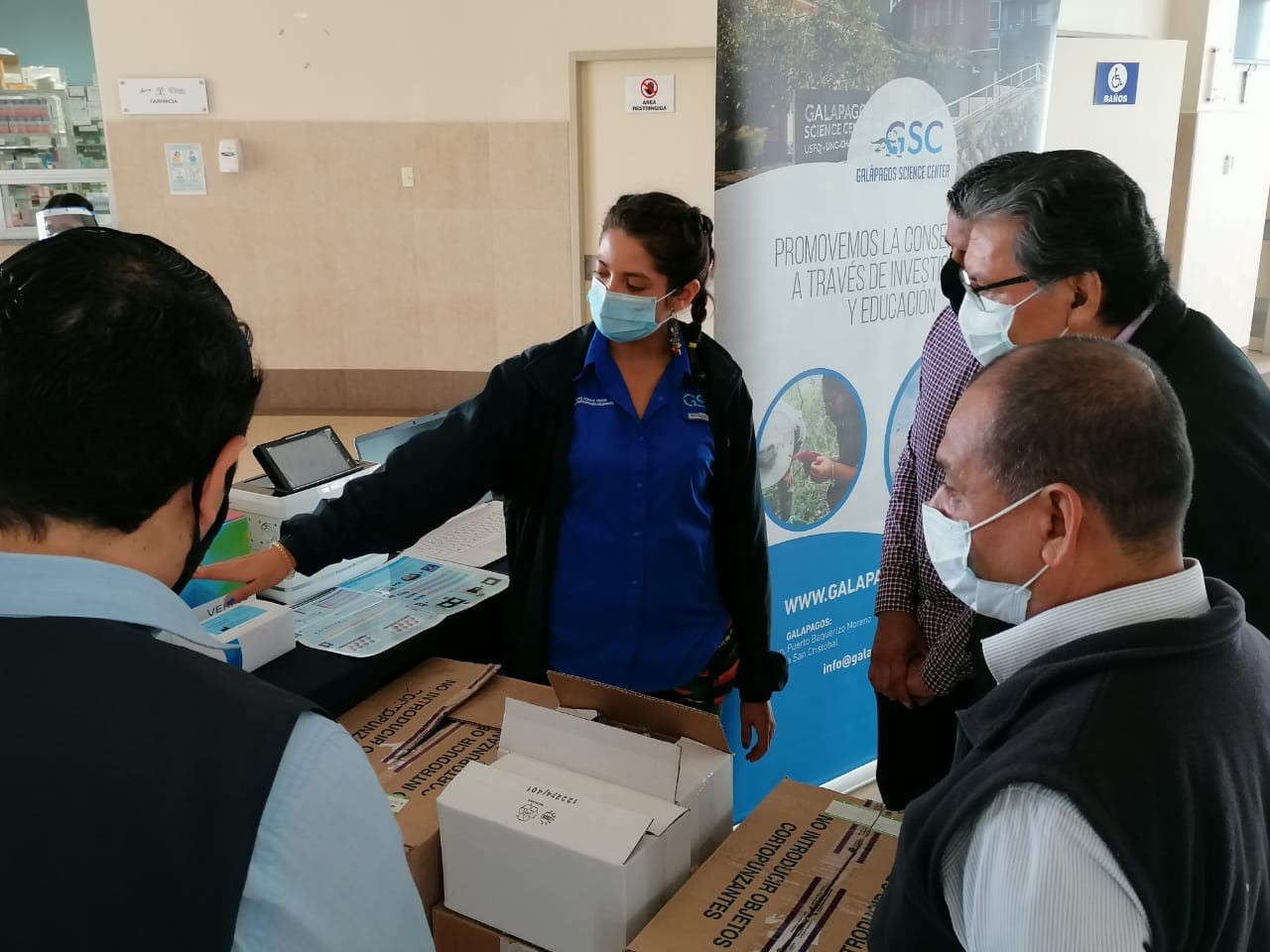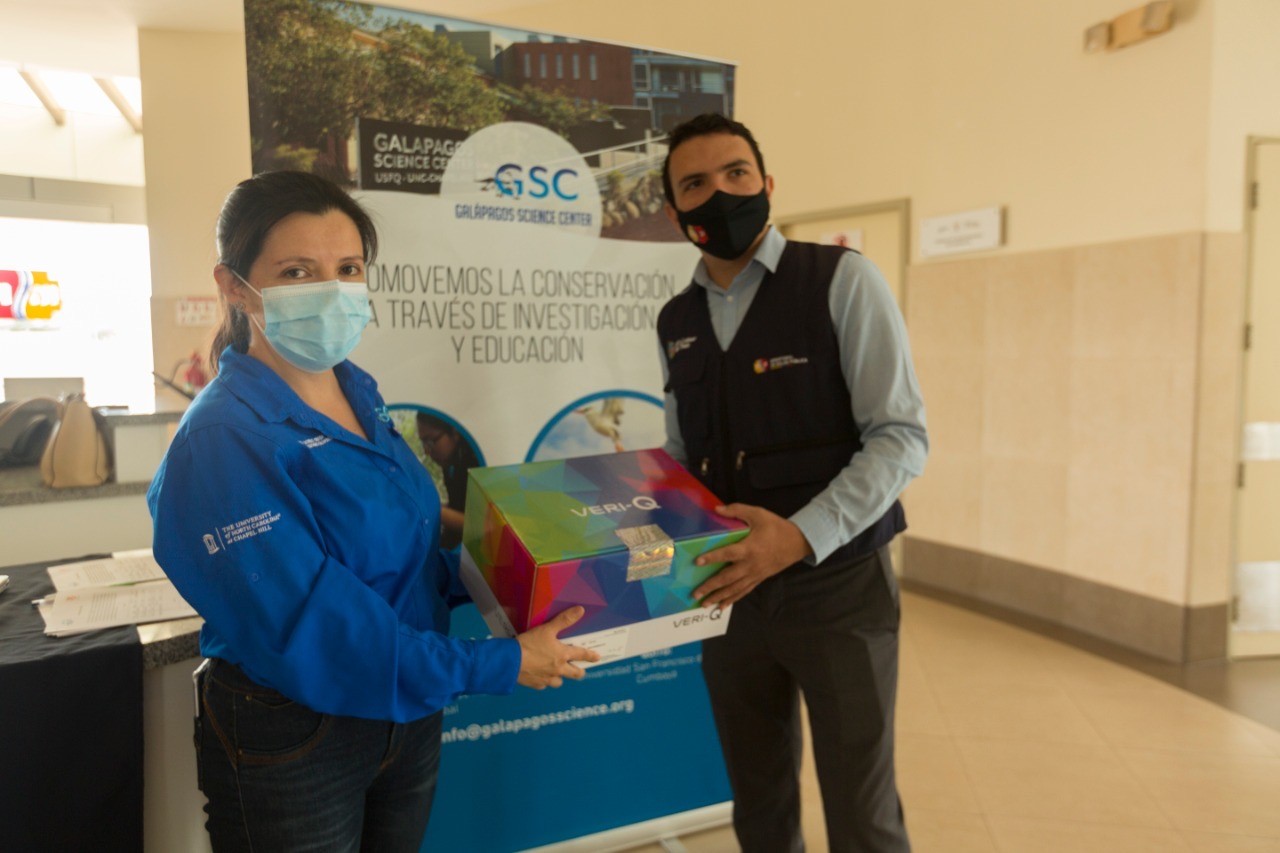The donation of PCR equipment and medical supplies will build detection and testing capacity for COVID-19 at Oskar Jandl Hospital in San Cristobal Island, Galapagos

On Wednesday, September 30th, the Universidad San Francisco de Quito (USFQ), the University of North Carolina at Chapel Hill (UNC), the Galapagos Science Center (GSC), and the USFQ Institute of Microbiology announced to the Community of Puerto Baquerizo Moreno on San Cristobal Island in the Galapagos Archipelago of Ecuador the donation of PCR equipment, a thermal cycler, detection kits, and other medical supplies to the Oskar Jandl Hospital on San Cristobal Island. This donation will generate the capacity to detect COVID-19 in San Cristobal and to perform diagnostic testing, thus safeguarding the welfare of the local community and visitors, and contributing to making the Galapagos a safe destination for residents, tourists, and faculty, students, and staff from UNC, USFQ, and collaborating institutions.
The donation of this equipment is part of a systematic process of support that the GSC, UNC, and USFQ Galapagos Extension have provided to the Oskar Jandl Hospital since the beginning of the health emergency in March 2020. The first donation of equipment, reagents, and medical supplies was made in May 2020. Additionally, technical support has been provided to improve the infrastructure of the Hospital’s laboratory to meet the quality standards required by the Ecuadorian Agency for Quality Assurance of Services of Prepaid Health and Medicine (ACESS) that accredits medical laboratories in Ecuador. Now, with the PCR team and the thermal cycler in the hospital, GSC, UNC, and USFQ will beginning training laboratory staff and will support the final phase of the ACESS accreditation of the hospital laboratory, designed by a joint UNC-USFQ faculty working group.
“Since the beginning, we have made available to the hospital all our human contingent material, PPEs, and general infrastructure support to the National Government of Ecuador through our technical assistance and capacity building associated with the enhancement of labs to mitigate the impact of COVID-19 in the Galapagos and to impact the social and economic effects in Galapagos from the COVID-19 pandemic,” commented Carlos F. Mena, co-director of the Galapagos Science Center. “The equipment that was donated to the hospital today will contribute to strengthening the Galapagos provincial health system by detecting positive cases of COVID-19 as well as other diseases, such as dengue and malaria, for the long-term benefit to the community.”

“The donations and continuing technical assistance program to the hospital demonstrate UNC’s and USFQ’s enduring commitment to the community and to the Galapagos Islands more broadly now and into the future,” commented Steve Walsh, director, UNC Center for Galapagos Studies and co-director, Galapagos Science Center, San Cristobal Island. “We also hope having this capacity at the hospital will help our UNC and global researchers get back to work faster and get the GSC back to full operation so we can continue our innovative research protecting island sustainability.”
Djalmar Zambrano, Oskar Jandl Hospital’s director, provided thanks for the donation and expressed that this will contribute significantly to the Ministry of Health’s efforts to detect cases of COVID-19 and strengthen health prevention and protection measures in the province.
Dr. Zambrano stated that “the implementation of the Oskar Jandl General Hospital’s laboratory with PCR equipment for sample processing was obtained through the donation and technical support provided by the Galapagos Science Center, a joint UNC-USFQ research, education, and outreach program and facility on San Cristobal Island. This new and enhanced capacity will allow us to perform faster on-site testing for suspected cases of COVID-19 and will improve the timing for results, free of charge for patients.”
